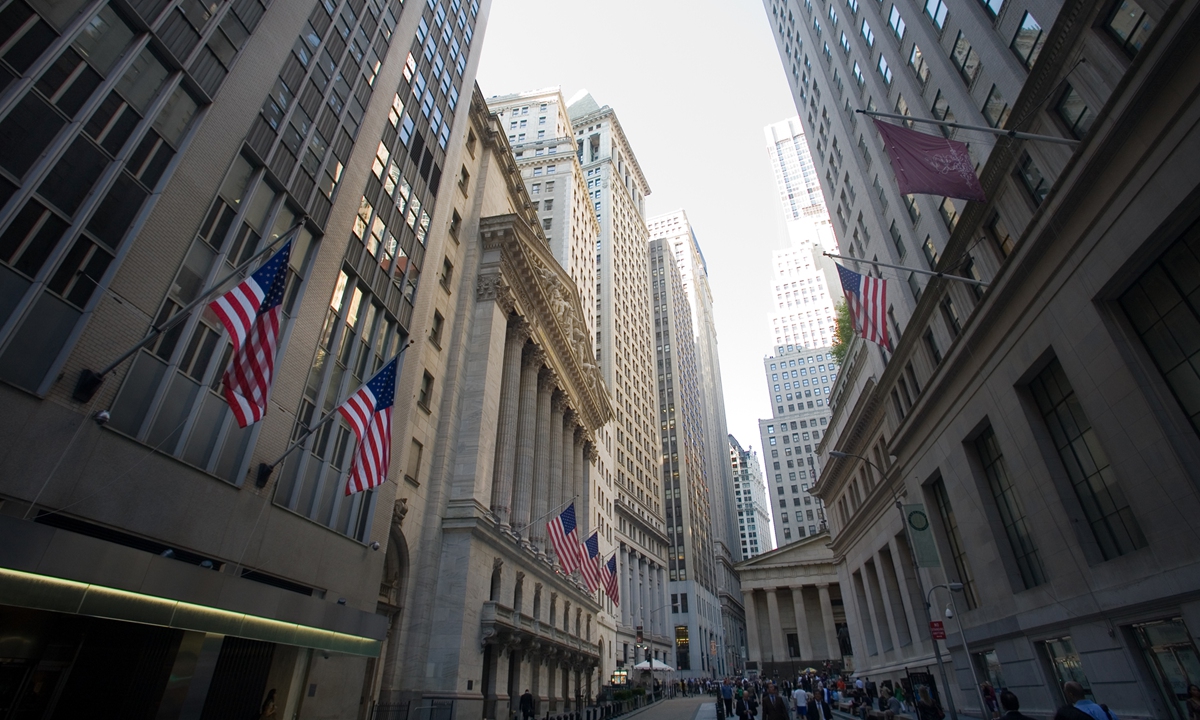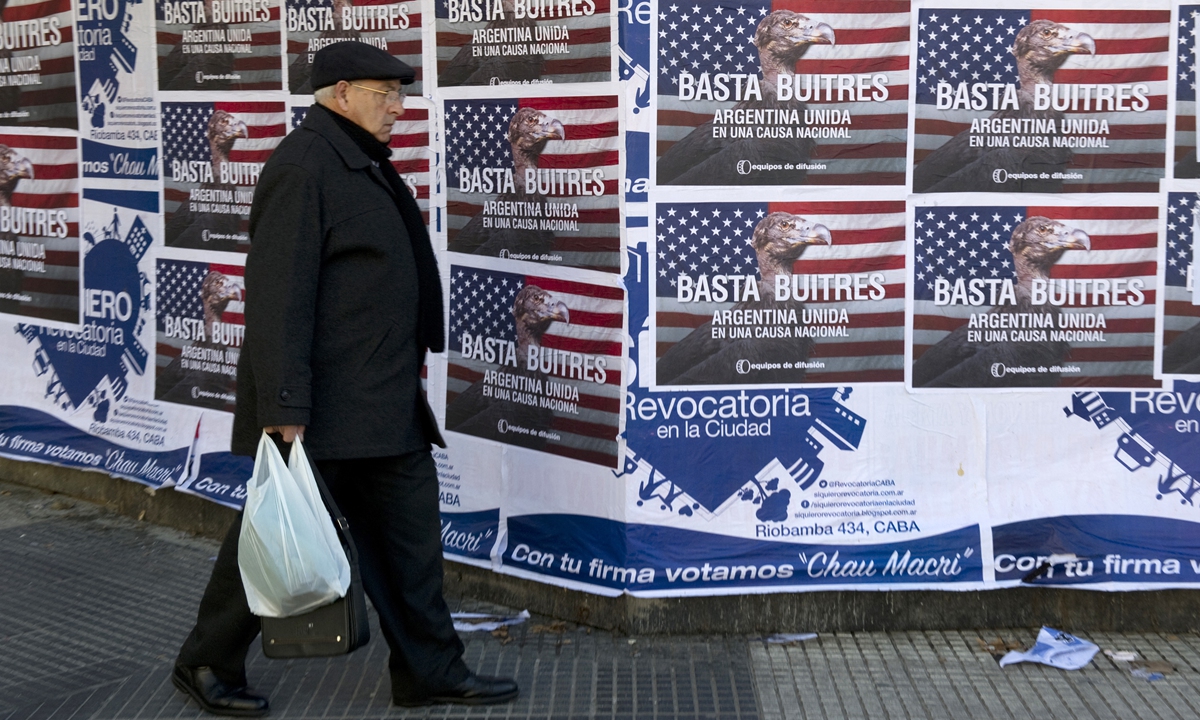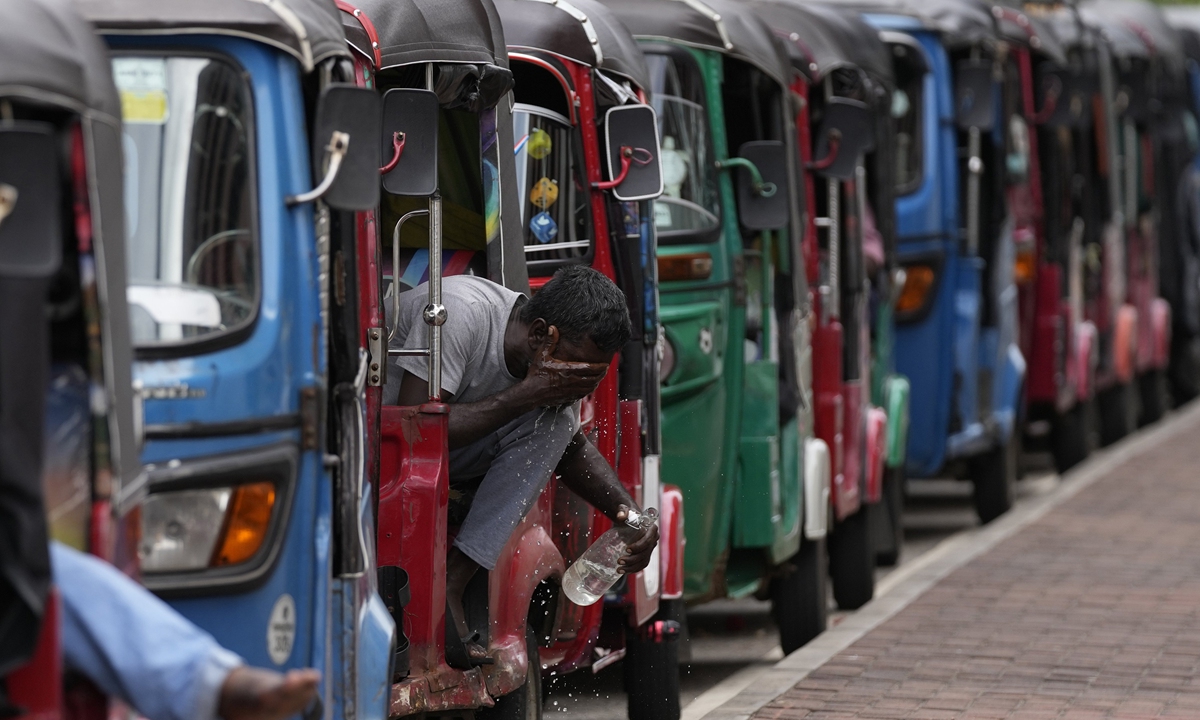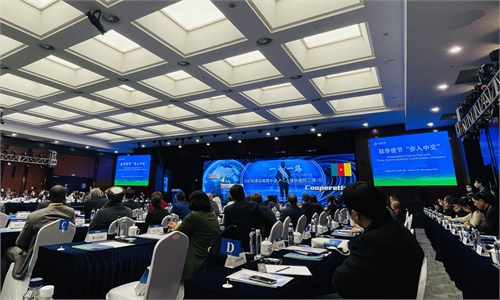IN-DEPTH / IN-DEPTH
GT investigates: How US financial institutions, interest groups worsen developing countries’ debt burden using ‘vulture funds’
Loan predators

A view of Wall Street in New York, the US Photo: IC
Some people in the West have frequently spread rumors targeting China-invested projects overseas, saying, for instance, that projects under the Belt and Road Initiative (BRI) have led involved countries into debt traps. China once again refuted this cliché rumor at the ongoing two sessions with strong evidence."Some countries say that China has created several 'debt traps' in Africa. Let's take a look at what the statistics of international organizations say," said Wang Chao, a spokesperson for the first session of the 14th National People's Congress (NPC), China's national legislature.
The claims held by multilateral financial institutions and commercial creditors account for nearly three-fourths of Africa's overall external debts, Wang said at a press conference on March 4, when asked to comment on some countries' attacks against China's so-called ineffective debt relief in Africa.
While the US-led West is busy pointing fingers at China, a few US financial institutions, as well as the interest groups behind them, are the main culprit of many economic losses and financial crises worldwide, which had even pushed some countries and regions into recession.
Observers noted that for decades, certain banks and investors in the US have been creating debt crises in several emerging markets in league with interest groups back home, in order to create huge financial windfalls.
One of their despicable acts are called "vulture funds." This infamous term has led to the exploitation of numerous victims across the globe, as former Argentine President Cristina Fernandez asserted that vulture funds "are practicing a kind of economic and financial terrorism."
"...terrorists are not only those who set off bombs, but also those who destabilize economies, causing hunger, misery, and poverty," Fernandez remarked at the United Nations (UN) General Assembly in 2014.
A hard lesson

A man passes by posters on a wall against the US' vulture funds in Buenos Aires, Argentina, on June 18, 2014. Photo: AFP
The vulture is a scavenger that feeds mainly on the carcasses of large animals. It always soars over open mountain plains, searching for dying and dead animals, feasting on their remains. Similarly, vulture funds tend to buy distressed assets below face value and then claim huge profits through malicious lawsuits.Within decades, vulture funds have bagged large sums of money from several developing countries including Argentina, Kenya, Ecuador, and Vietnam, by purchasing sovereign debt from said countries near or in default at great discounts and creating indirect obstacles to debt restructuring, observers told the Global Times.
Argentina had learned a hard lesson from vulture funds. To pull through the Argentine Great Depression (1998-2002), the country was set upon by debt revamps twice in 2005 and 2010, the result of which was accepted by over 90 percent of its creditors. A few vulture funds, such as NML Capital, a subsidiary of US Elliott Management, bought the defaulted bonds at bargain prices while shunning settlement processes.
The funds hauled Argentina to courts in the US in 2005, demanding full repayment of the principal and interest of the country's debt. In 2016, the US Supreme Court eventually forced Argentina into an agreement, ruling that the country had to pay the fund back at full value at a cost of $4.65 billion, an equivalent to 0.83 percent of its GDP that year.
Based on the agreement, NML Capital would receive $2.28 billion for its investment of about $177 million, a total return of 1,180 percent. And Argentina had to also pay for the incurred legal fees for the vultures aside from the hefty payment, media reported.
In an opinion piece titled "How Hedge Funds Held Argentina for Ransom," published by The New York Times in April 2016, authors warned that the agreement would carry a high price for the international financial system, for it was "encouraging other funds to hold out and making debt restructuring virtually impossible."
"Why would bondholders accept a haircut if they could wait and get exorbitant returns for a small investment?" the article asked.
To achieve their goal of extracting high profits, vulture funds tend to further harm local markets by creating a panic atmosphere there, said Yu Xiang, a non-resident senior fellow at the Center for International Security and Strategy, Tsinghua University.
"Causing panic by spreading rumors is their common trick,"Yu told the Global Times."When [a country or region is] in a poor economic situation, rumors and fake news will cover up facts and confuse the public, which definitely worsen its market prospects."
Connivance by government and judiciary
Vulture funds, a legal but immoral business, are all the rage on Wall Street in the US, with the appeasement of the US government and the judiciary, where several financial predators increasingly prefer to further aim their "blackmail" guns at the third world's sovereign nations, relying on favorable court rulings in most cases, and grinding down poor countries in cycles of litigation.
An example of such nefarious figure is American billionaire hedge fund manager and activist Paul Elliott Singer, who was described as a "financial terrorist" and "vulture lord" by Fernandez, whose strategy is to cheaply buy the sovereign bonds of struggling countries, and then go after said countries for unpaid debts, according to the Guardian.
In 1996, Singer's hedge fund EMC bought $20-million-worth of defaulted Peruvian debt at a discounted price of $11.4 million, then confiscated former president of Peru Alberto Fujimori's jet, and eventually fork out some $58 million in payment from its treasury through lawsuits.
With a reputation for what Fortune magazine called "strong-arming his way to profit," the way Singer operates against his opponents was intensified in the subsequent proceedings against Argentina. In 2012, NML detained an Argentine naval vessel in Ghana under a US court order after a demand for the repayment of defaulted government bonds.
"Wall Street financial power has long had close ties with the US Congress and the federal government, and have the incentive and ability to defend their unjust enrichment by interfering in national law and policy making," said Zhang Yuewen, a researcher at the Institute of Finance and Banking at the Chinese Academy of Social Sciences.
Zhang pointed out that litigation actions by US vulture funds are typically pursued in US courts, and the country's law also supports the litigants carry out international sanctions. "By focusing on specific default cases and giving less consideration to the overall sovereign debt restructuring of other countries, the US court system has created the consequence of 'protecting a minority at the expense of the majority,'" Zhang told the Global Times.
The activity of US vulture funds in international capital markets is directly related to US hegemony, the connivance of the country's domestic laws, and internationalized capital markets, Zhang said, noting that with the absence of global governance and the US hegemony ravaging international financial markets, US vulture funds may be getting more aggressive.
In 2012, The US-based investment management firm, FG Hemisphere, even tried to seize the Democratic Republic of the Congo's Washington Embassy for a $100-million debt that the government owed them, which was later blocked by the privy council of the UK.
According to the Guardian, in an attempt to circumvent British law, which bans vulture funds from buying poor nations' debts, FG Hemisphere took the case to Jersey, a crown dependency not covered by UK law.
In order to limit the damage of speculation, the UK and Belgium have enacted laws to crack down on litigation by vulture funds, but the US is still lenient. "Because the actions of its vulture funds around the globe do not endanger US national interests, but instead provide an opportunity for the country to exercise financial hegemony and long-arm jurisdiction, further interfering and disrupting the internal affairs of other countries," Zhang said.
Thief crying 'stop thief'

A rickshaw driver washes his face as he waits in a queue hoping to get fuel near a fuel station in Colombo, Sri Lanka, on June 24, 2022. Photo: VCG
At present, people frequently see the US government and vulture funds' financial predators team up to feast on the financially weak. The US has never reflected on the deep disasters its financial moves have wrought in other countries, but instead presumes to blame China for "laying debt traps globally."For example, amid Sri Lanka's economic woes, the US media recklessly hyped that "China is the main source of Sri Lanka's debt crisis."
However, data from Sri Lanka's Department of External Resources showed that as of April 2021, the plurality of its foreign debt is owned by Western, particularly American, vulture funds and banks, which hold nearly half of all Sri Lankan debt at 47 percent, Xinhua News Agency reported.
Contrary to the "debt trap" narrative, China is not Sri Lanka's largest creditor, but rather it is the largest foreign direct investor in the country. China's investments in Sri Lanka are long-term projects that gradually increase the productivity of the economy, Hussein Askary, vice president of the Belt and Road Institute in Sweden, previously wrote in a piece published by the Global Times.
Faced with a question from an Associated Press reporter about whether the BRI led to debt traps at the press conference held on the sidelines of the NPC session on March 7, 2023, Chinese Foreign Minister Qin Gang said that 10 years after its inception, the BRI has evolved from vision into reality, boosting development in partner countries and bringing real benefits to the people. A decade of efforts has laid down a pathway toward common development, and created an array of national landmarks, livelihood projects, and milestones of cooperation.
"China should be the last one to be accused of the so-called debt trap. Data shows that multilateral financial institutions and commercial creditors account for over 80 percent of the sovereign debt of developing countries. They are the biggest source of the debt burden on developing countries," he said.



